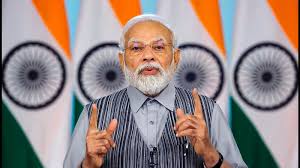Brij Bhardwaj
Prime Minister Narendra Modi has made a flying start in his third term as Prime Minister. The formation of Union cabinet took place smoothly, as was the allocation of portfolios. There were many who expected fireworks and demands by allies like Telugu Desam and Janata Dal and expected problems hoping that there would be demands for key portfolios by allies.
But there were no voices of dissent when all key portfolios like Home, Defence, Finance and External Affairs were retained by BJP. The reason for the smooth process was because the opposition parties missed the plot, that the two allies who have joined the coalition were more interested in development of their respective States, Andhra Pradesh and Bihar, instead of having a major hand in running the Central Government.
Mr Naidu believes that funds for building a new capital city for Andhra Pradesh should be his top priority. He suffered a big loss when the city of Hyderabad developed by him as a hub for industry became the capital of Telangana. He needs funds for this purpose which can only be provided by the Centre. The building of the new capital city on the pattern of Hyderabad will not only be a show piece, but also provide employment for youth, a major demand in the state.
On the other hand, Bihar Chief Minister Nitish Kumar also needs funds for development, as lakhs of young people from Bihar go to other states like Maharashtra, Tamil Nadu and other states seeking jobs. You also find them hanging on top of trains to go home during holiday season. As such the objective of Prime Minister Modi and the two allies Mr Naidu and Mr Nitish Kumar are aligned and there is no major conflict which may make it easier for them to work together
There are, however problems which may arise in future. As elections are to be held soon In U.P, Maharashtra, and Haryana where opposition parties hope to score. This could hurt the National Democratic Alliance standing. But it also depends if the parties which have come together remained united. There are also voices of dissent between RSS and BJP. But all this is in the future. At present Prime Minister Modi is settled in his third term and launching his plans to make India third largest economy in the world.
His advantage is that the industrial houses of India are totally with him in his efforts to make India into a developed country instead of a developing country.
The opposition parties were hoping to win over one of the two allies supporting BJP and went to the extent of offering the job of Prime Minister to Nitish Kumar but it did not work. They were hopeful as there are differences on the issue of Agniveer or a common civil code. But so far the allies have not changed their minds and have decided to resolve all differences by way of discussions. There was also a feeling that Prime Minister Modi who has so far run a complete majority Government with him alone in command, will not be comfortable in a coalition. They may find that Mr Modi may work equally well with allies.
There is lot at stake for three partners in coalition and that alone may act as glue. Mr Modi wants to prove his critics wrong. Nitish Kumar and Mr Naidu feels it is a last chance for them to prove they not only can they pull votes but also build the states which have remained in state of poverty, while they look at neighbours moving ahead and progressing.
Trending Now
E-Paper


